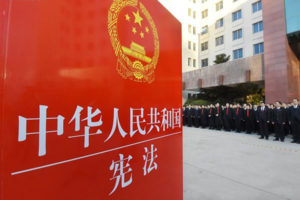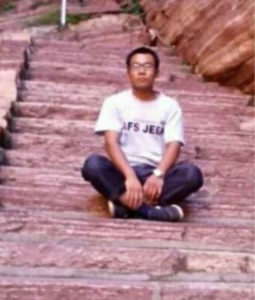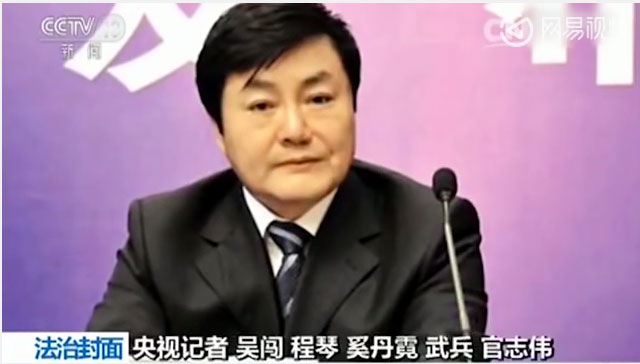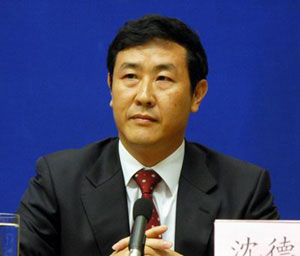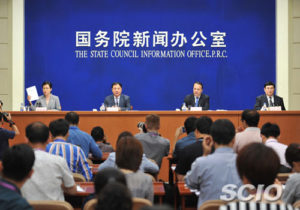When Xi Jinping was installed as leader of the Chinese Communist Party (CCP) in late 2012, he began to develop a political platform called ‘governing the nation in accord with the Law’ — yifa zhiguo 依法治国. The term yifa zhiguo had already entered public discourse under President Jiang Zemin in 1996 and was enshrined into the Constitution in 1999. The Xi leadership has infused it with fresh ideological qualities, creating a more intimate relationship between law and politics than was the case when the phrase first came into use twenty years ago.
In Xi’s yifa zhiguo platform, ‘reform’ and ‘party leadership’ are promoted and sold as inseparable. In a speech marking the ninety-fifth anniversary of the founding of the CCP, on 1 July 2016, Xi Jinping declared that ‘ “reform” and “rule of law” are like the two wings of a bird or two wheels of a vehicle … The core meaning of governing the nation in accord with the law is that it organically unifies the idea of “upholding the primacy of party leadership” with “making the people the master of the nation”.’
Yifa zhiguo is being advanced through various judicial reforms that encourage transparency and help to give judges greater credibility in the eyes of the public. But it is also playing out through a renewed war on human rights lawyers, dissenters and NGOs as well as corrupt officials. Xi’s version of yifa zhiguo unfolded in the justice realm in both these areas in 2016: reform through ‘quality control’ and repression through social control.
Holding High the Yifa Zhiguo Banner
Xi Jinping’s vision for yifa zhiguo encourages Chinese citizens not just to respect the law but to actually ‘worship the Constitution’ 崇拜宪法. This is different from previous calls by some independent thinkers in China to respect the Constitution, which they take to stand for the rights of the citizen. (See the China Story Yearbook 2015: Pollution, Chapter 2 ‘The Fog of Law’) The Constitution here stands for the supremacy and centrality of the Party, as its preamble gives the Party authority to lead the nation. Xi wants to place leadership by the Party at the centre of governance in China and he is doing this by promoting ‘party rule in accordance with the law’ yifa zhizheng 依法执政 and yifa zhiguo as one and the same thing.
In late 2015, the Party’s Propaganda Department 中共中央宣传部 sought to cement the association between the Constitution and yifa zhiguo by declaring 4 December to be both ‘Constitution Day’ 宪法日 and ‘Rule of Law Propaganda Day’ 法治宣传日. This followed a decision that month by the Ministry of Justice 司法部 to make ‘the leadership of the Party over the legal system’ the centerpiece of its propaganda work over the following five years. Wu Aiying 吴爱英, the Minister of Justice, announced at the time that the promotion of yifa zhiguo through the justice system aimed ‘to integrate legal dissemination and rule of law propaganda work into the Party’s overall governance plans’, with the central message being that ‘the Party leads, the National People’s Congress supervises, and the government implements policies’.
‘Rule of law propaganda work’ 法治宣传工作 is a responsibility shared by courts, prosecution agencies, and police. It operates in unison with ‘law dissemination and education activities’ 普法教育活动, which are the remit of the Ministry of Justice and the Party’s Propaganda Department. On 28 April 2016, the National People’s Congress (NPC) endorsed the Seventh Five-Year Legal Law Awareness and Dissemination Campaign 普法教育活动 (2016–2021), confirming that yifa zhiguo and the Constitution would be at the centre of the Party’s propaganda work on legal issues for the next five years.
Aiming for ‘Fairness’ and ‘Efficiency’ in Sentencing
Xi’s yifa zhiguo agenda signals a change in how crimes are punished within China’s legal system. Since October 2014, judicial authorities have been trialling various ways to optimise the allocation of resources to improve efficiency in the way they handle cases of minor crimes. In September 2016, Supreme People’s Court 最高人民法院 (SPC) Chief Justice Zhou Qiang 周强 announced new pilot programs aimed at dealing with minor crimes with ‘fairness’ 公正 and ‘efficiency’ 效率.
Also in September this year, the NPC formally approved the introduction of plea-bargaining pilot programs in eighteen cities across China. When the Party abolished the notorious and much-maligned, police-run ‘Re-education Through Labour’ (RETL) 劳教 system in December 2013 (See the China Story Yearbook 2014: Shared Destiny for details), it risked lumbering an already overburdened court system with even more cases, most of them relatively minor in nature (for example, petty theft, prostitution, and possession of a small amount of illegal drugs). Plea bargaining is a sensible solution. Just as in countries with common law — for example, the US, England, Wales, and Canada — if a suspect voluntarily confesses to a crime, the prosecutor can recommend a more lenient punishment than would be the case if the suspect pleaded not guilty and the case had gone to trial.
As for more serious crimes, legal experts note an emerging trend of tougher punishments for major drug crimes, including execution, and continued use of the death penalty for homicide cases that are deemed to have had a significant impact on social order. It seems that the regime is beginning to pull back slightly on the more lenient ‘harmonious justice’ agenda of the Hu Jintao 胡锦涛 era (2002–2012) that recognised a greater variety of mitigating circumstances to consider in sentencing.
For instance, in November 2016, the SPC approved the death sentence for the rural worker Jia Jinglong 贾敬龙 found guilty of murdering a local official who had ordered the forced demolition of his family’s home. Jia had been the victim of unlawful intimidation and beatings when a team of unidentified people demolished the house. Local police observed the beatings and filmed the incident but did not step in. In the months following the incident, Jia’s petitions for adequate compensation were repeatedly ignored. An online uproar followed the SPC decision, with people arguing that the failures of the system to acknowledge Jia’s rights or even give him a hearing had driven him to desperation.
This is a subject that resonates with people in cities and the countryside alike, as forced demolitions have for decades led to frequent conflict and abuse. High-profile Chinese legal experts waded into the debate, arguing that nowadays courts routinely accept a range of mitigating circumstances in deciding the fate of convicted murderers. His case was an obvious example of provocation that not so long ago would have resulted in a ‘suspended’ death sentence, which would have been converted into a life sentence after two years. Even the conservative Global Times argued that Jia should not be executed. As arguments against the death penalty for Jia reached fever pitch in the days leading up to his execution, the Party shut down the debate. A People’s Daily editorial warned against online public opinion hijacking the debate, said that citizens should trust the law and their opinions should not contradict those of the authorities.
It did not escape people’s notice that Jia Jinglong and other ordinary citizens are rarely afforded the same opportunity for fairness or leniency in sentencing enjoyed by many corrupt officials. Since the anti-corruption campaign began three years ago, over eighty senior officials have been prosecuted but none have received the death penalty for corruption-related crimes, no matter how egregious. For instance, on 17 October, Wei Pengyuan 魏鹏远, the former deputy director of the National Energy Administration, who had embezzled over 200 million yuan from the public purse (they found the amount in cash at his house), was given a suspended death sentence. Many officials have blown the whistle on colleagues and confessed their own crimes on state television in exchange for a degree of ‘fairness’ that was out of reach to Jia.
Reforming for Quality Control
When Xi Jinping declared in July 2016 that ‘reform’ and ‘rule of law’ are like ‘the two wings of a bird’, he also stressed: ‘It is the Party that must lead all rule of law activities including legislation, law enforcement, administration of justice and law observance’. By ‘Party’, he was referring to the central leadership with himself at the helm. Judicial power is thus shifting away from local courts and back into the hands of top judicial authorities in Beijing (see the China Story Yearbook 2015: Pollution, Chapter 2 ‘The Fog of Law’). The centre can control the reform agenda more effectively if it limits the power of local political and judicial authorities to act independently. This is part of an effort at ‘quality control’ of lower level political and legal authorities to prevent further erosion of faith in the Party due to corruption and other failures of the system at the local level.
Since 2015, a new politico-legal catchphrase has emerged: ‘placing the trial at the centre’ 一审判为中心. According to SPC Deputy President Shen Deyong 沈德咏, this is intended to break the longstanding custom of ‘investigation-centered-thinking’ 以侦查为中心 in favour of the rigorous testing of evidence through the trial process. On 10 October 2016, the SPC, the Supreme People’s Procuratorate 最高人民检察院, the Ministry of Public Security 公安部, the Ministry of State Security 国家安全部, and the Ministry of Justice issued a Joint Opinion summarising the importance of developing a trial-centred litigation system. This aims to shift local functionaries’ mindsets about the value of a court trial, and stresses the importance of collecting a greater variety of evidence that can be tested through cross-examination in the courtroom. These reforms are intended to ‘standardise’ 规范化 judicial practice across China and to prevent the kind of miscarriages of justice that were common when the focus was on the investigation itself. The goals of the reforms include:
- ensuring that evidence is untainted
- encouraging witnesses to testify in court, thus testing their evidence through cross-examination
- emphasising that the burden of proof lies with the prosecution
- giving defendants access to a lawyer and giving lawyers access to defendants’ case files
- understanding that the standard of proof requires excluding reasonable doubt
- ensuring that only lawfully obtained evidence can be presented at trial
- improving the legal aid system.
The standardisation of judicial decision-making aims to bring a more unified approach to justice in China, so that ‘similar judgments are made for similar cases’ 同案同判 across the nation. One of the most successful attempts in 2016 to improve oversight mechanisms and transparency and to standardise judicial practice has been to develop online access to trials and live coverage of selected trials. The SPC is now promoting the discriminate use of cameras in Chinese courts, including in its own courtrooms in Beijing. As Susan Finder reported on her influential blog Supreme People’s Court Monitor in July, provincial courts across the country are now uploading many of their cases to the Internet. Cameras and live streaming are a key component of the SPC’s ‘smart courts’ program, which itself is part of a larger e-services initiative that includes online case registration and online petitions. The latter refers to official complaints that citizens lodge against local government or court rulings.
Live streaming of (hand-picked) court cases has the additional advantage of helping lawyers, prosecutors, and judges in less-developed areas understand how to cross-examine witnesses in court and to learn about other ‘trial-centred’ processes. The SPC estimates that by 2018, around 3,500 courts will participate in the live streaming of over one million cases.
China has approximately 200,000 judges. In 2016, they heard over seventeen million cases and their workload has been increasing. As part of the overall yifa zhiguo reform package, SPC authorities in Beijing are also removing many legal staff in local courts who hold the title of ‘judge’ but in reality only perform bureaucratic tasks, thus further overburdening remaining staff. Beijing authorities’ repeated promises to improve work conditions for the judiciary have not been enough to stop the haemorrhaging of judges from the system in recent years. According to one report, over one thousand judges have recently resigned, citing the burden of their caseloads, insufficient remuneration, lack of community respect for the profession, and lack of promotion opportunities as their main reasons.
Notwithstanding the problem of a decreasing number of judges, this suite of reforms is part of a larger parcel of initiatives aimed at bolstering the credibility of the judicial system in the eyes of the public through increasing the perception that it is fair and efficient. This would have the additional but not incidental benefit of encouraging those with civil and economic complaints to make the courtroom, not the streets, the site of dispute resolution, thereby allowing the state to better control petitioning, dissent, and discord.
On 12 September 2016, the State Council Information Office 国务院新闻办公室 issued its first-ever White Paper on the subject of the judicial protection of human rights. Since they were first issued in 1991, China’s yearly White Papers, which are primarily aimed at a foreign audience, have consisted of general descriptions of China’s progress in economic, social, and cultural rights. For the first time, the 2016 White Paper created a direct and explicit link between human rights achievements and judicial guarantees, implicitly linking judicial reform with state legitimacy. It emphasises how the judiciary is being strengthened to provide human rights protections: ‘the judiciary is the last line of defence to safeguard social fairness and justice, and judicial protection of human rights is an important part of human rights progress in a country … Strengthening judicial protection of human rights will continue to be a major task in implementing the rule of law.’ It is also remarkable that the White Paper devotes an entire section to the ‘Legitimate Rights and Interests of Detainees’, a sensitive topic not central to political priorities. Specifically, it urges more effective supervision over prisons and detention centres to increase the transparency of law enforcement in this area and prevent illegal interrogation and forced confessions. The White Paper also promotes the standardisation of practices regarding sentencing, commuting, parole, and the establishment of an open national freedom of information network.
Controlling Dissent Through Law
As constructive as these new developments may be, they do not signal a tectonic shift in the culture of China’s justice system, given the stress put on the Party’s role. Improvements and reforms sit alongside a set-in-stone politico-legal culture that relies on the supremacy of the Party and the maintenance of social and political stability. As in the past, the Party-state is using its politico-legal organs to fight against what the Party identifies as major threats to the nation, including corruption, crime, and dissent.
In 2015, (see the China Story Yearbook 2015: Pollution, Chapter 2 ‘The Fog of Law’) we reported on the plight of Chinese human rights lawyers who were taken into custody or ‘disappeared’ at the hands of the authorities in July and August that year. This large-scale action against lawyers, legal staff, and rights advocates seeing some arrested on charges of ‘picking quarrels and provoking troubles’ and ‘inciting subversion of state power’ is now known among international observers as the ‘709 Incident’, 709 referring to 9 July 2015, when the Party first launched the repressive crackdown. One year later, eight of the lawyers, their assistants and other activists associated with them were still detained pending trial. Six were sentenced at first trial and twenty-six have been released on bail. Within one week in August 2016, four of the detained lawyers and human rights activists appeared in televised trials confessing to their crimes and denouncing themselves as instruments of anti-Communist Western forces. A municipal court in Tianjin Second People’s Intermediate Court sentenced lawyer Zhou Shifeng 周世锋 to seven years’ imprisonment for subversion of state power, activist Hu Shigen 胡石根 to seven and a half years, activist Zhai Yanmin 翟岩民 to a suspended three-year prison term, and activist Gou Hongguo 勾洪国 to a three-year suspended sentence. Chinese domestic media gave their trials an unprecedented amount of publicity. Convicting lawyers and activists for subversion and giving their trials such wide publicity is unprecedented. It may indicate the desire of the government to delegitimise the lawyers’ defence of their clients’ rights, in some cases, by smearing them with the charge of being under foreign influence. Presumably, this is to warn those who would use the courts to fight for their rights or those of their clients against the interests of the state that they will be considered to have done so for political purposes — and that there are grave risks to such actions.
Foreign Influence on Trial

Still from five-minute video: ‘If you want to change China, you need to step over our dead bodies first’
Source: YouTube
The subject of foreign influence is a very sensitive one. Over a few days at the end of July and the beginning of August, more than ten state-owned media outlets within China, including the micro-blogging networks of the Supreme People’s Procuratorate and the Communist Youth League, ran a video accusing the US of providing support to human rights lawyers as well as separatist movements in Tibet, Xinjiang, Taiwan, and Hong Kong. The five-minute video, titled ‘If you want to change China, you need to step over our dead bodies first’, depicted the US sowing dissension and internal unrest in Iraq, Libya, Egypt, and the like, promoting the theory that it has similar intentions in China. While Chinese media has previously accused the US and other Western powers of providing aid to China’s NGOs and civil society groups, this was the first time that a direct line had been drawn between China’s human rights lawyers and the US government. Praising the verdicts against the four legal rights advocates, a 6 August commentary in the People’s Daily referred to the Chinese Constitution: ‘Our nation’s Constitution points out in a clear-cut manner, that, “The Chinese people must carry out the struggle against domestic and foreign hostile forces and hostile elements that antagonise and damage our country’s socialist system”. ’ This ‘aggressive discourse’ — as China Media Project director Qian Gang 钱钢 defines it — is a strong reminder of the way that language was used in the Maoist era at times of real or perceived vulnerability for the CCP.
Opposition toward perceived Western interference in Chinese affairs is also manifest in the Law on the Management of Foreign NGOs’ Activities 境外非政府组织境内活动管理法 within mainland China, which the Chinese legislature passed on 28 April 2016 (and which came in force on 1 January 2017). Two previous drafts of the law had been introduced in December 2014 and in May 2015 (see the China Story Yearbook 2015: Pollution, Chapter 2 ‘The Fog of Law’). The law includes a number of provisions that are extremely vague and is thus — from the perspective of foreign scholars, NGOs, and civil society advocates — dangerously open to interpretation by the Chinese authorities, which may use them to criminalise a wide range of activities that they may deem politically sensitive. A particularly problematic aspect of the law is that it places foreign NGOs under the control of public security organs rather than the Ministry of Civil Affairs, which had previously been responsible for all Chinese NGOs. (See Forum ‘Meet the State Security: Labour Activists and their Controllers’) The law, which emphasises national security, assumes that foreign NGOs potentially threaten both security and social stability.
Control over civil society is of paramount importance to the Party under Xi. On 21 August, the Party Central and the State Council issued an ‘Opinion on Domestic Civil Society Organisations’ to accompany the Charity Law issued on 31 August, which allows for direct registration of certain types of civil society organisations without the need for an official sponsoring organisation as required in the past. The Opinion also stresses the importance of the Party’s control over civil society organisations and their founders, who will be requested to undergo ‘political education’. It also emphasises the need to ‘strengthen and standardise’ the international contacts of domestic civil society groups.
Conclusion
Xi Jinping’s yifa zhiguo platform reframes reforms of the justice system to correspond with the Party’s broader goals to: strengthen political control over legal matters, re-centralise power, standardise decision-making, and bolster credibility. The Party’s interpretation of ‘rule of law’ is highly legalist. It works against those individuals in society who interpret values such as fairness and justice differently from the Party. We see a repressive legalism on display in the way that the Xi leadership is crushing rights lawyers and interpreting their pleas for justice as political subversion. At the same time, we are also witnessing impressive attempts to reform the justice system and make it both fairer and more efficient.
This reform–repression dualism as expressed by yifa zhiguo presents itself as an alternative to the dominant international understanding of the rule of law. Through yifa zhiguo, the Party is doing nothing less than creating its own distinct interpretation of ‘justice’ and ‘rule of law’ as ‘core socialist values’.

The Law on the Management of Foreign NGOs’ Activities came into force on 1 January 2016
Source: uscnpm.org
Notes
‘Xi Jinping likens “reform” and “rule of law” to a birds two wings or a vehicle’s two wheels 习 近平:改革和法治如鸟之两翼、车之两轮’, Sina News, 1 July 2016, available at: http://news.sina.com.cn/o/2016-07-01/doc-ifxtrwtu9635394.shtml
Wu Aiying, ‘Conscientiously summarising 6:5 law dissemination work, meticulously devel- oping rule of law propaganda and law education 认真总结“六五”普法工作深入开展法治宣传 教育’, Legal Daily, 26 May 2016, online at: http://www.legaldaily.com.cn/index_article/content/2016-05/24/content_6649102_2.htm
‘2015 launch of propaganda activities relating to propagating national constitution day and national rule-of-law propaganda day 2015年国家宪法日暨全国法制宣传日系列宣传活动 启动’, China Economic Net, 20 November 2015, online at: http://www.ce.cn/xwzx/gnsz/gdxw/201511/20/t20151120_7076495.shtml
‘China approves plea bargaining in criminal cases’, Xinhuanet, 3 September 2016, online at: http://news.xinhuanet.com/english/2016-09/03/c_135657703.htm
Zhao Yusha, ‘Lawyers rush to halt execution of villager who killed o cial over demolition’, Global Times, 23 October 2016, online at: http://www.globaltimes.cn/content/1013223.shtml
Zhao Li, ‘The Jia Jinglong case as a window into how fake online news commentary negatively impacts on the authority of the judiciary 从贾敬龙案看不实网络舆论冲击司法权威’, People’s Daily, 14 November 2016, online at: http://opinion.people.com.cn/n1/2016/1114/c1003-28859871.html
‘Chinese official who had £24m cash at home given suspended death sentence’, The Guardian, 17 October 2016, online at: https://www.theguardian.com/world/2016/oct/17/chinese-official-who-had-24m-cash-in-his-house-given-suspended-death-sentence
Nectar Gan, ‘Whistle blowing, confessions and showing remorse: how China’s corrupt o cials try to get lighter sentences’, South China Morning Post, 1 November 2016, online at: http://www.scmp.com/news/china/policies-politics/article/2041927/whistle-blowing-confessions-obvious-remorse-how-chinas
‘Xi Jinping likens “reform” and “rule of law” to a birds two wings or a vehicle’s two wheels 习 近平:改革和法治如鸟之两翼、车之两轮’, Sina News, 1 July 2016, available at: http://news.sina.com.cn/o/2016-07-01/doc-ifxtrwtu9635394.shtml
Shen Deyong, ‘Placing trials at the centre of procedural law reform 论以审判为中心的诉 讼制度改革’, Chinese Legal Science, Issue 3 (2015): 5–6, online at: http://www.cqvip.com/qk/81418x/201503/665072329.html
English translation available on online at: http://chinalawtranslate.com/?lang=en
Jiang Xingguang, ‘SPC President calls for enhancement of e-courts’, People’s Daily, 18 July 2016, online at: http://english.court.gov.cn/2016-07/18/content_26130909.htm
Susan Finder, ‘Supreme People’s Court starring on court TV’, Supreme People’s Court Monitor, 14 July 2016, online at: https://supremepeoplescourtmonitor.com/2016/07/14/supreme-peoples-court-starring-on-court-tv/
David Wertime and Jerome Cohen, ‘A crack of daylight enters Chinese court proceedings’, Foreign Policy, 12 October 2016, online at: http://foreignpolicy.com/2016/10/12/a-crack-of-day-light-enters-chinese-court-proceedings-live-streaming-transparency-reform-doubts/
‘SPC Work Report for 2017 full text: Zhou Qiang on work report content 最高人民法院工作报告 2017年全文:周强最高法报告内容’, Minnan News, 13 March 2017, online at: http://www.mnw.cn/news/china/1625581.html
Susan Finder, ‘Why are judges resigning?’, Supreme People’s Court Monitor, 23 August 2016, online at: https://supremepeoplescourtmonitor.com/2016/08/23/why-are-chinese-judges-resigning/
‘Full text: new progress in the judicial protection of human rights in China’, Xinhuanet, 12 September 2016, online at: http://news.xinhuanet.com/english/china/2016-09/12/c_135681609_13.htm
‘[“709 crackdown”] Latest data and development of cases as of 18:00 23 February 2017’, China Human Rights Lawyers Concern Group, 23 February 2016, online at: http://www.chrlawyers.hk/en/content/%E2%80%98709-crackdown%E2%80%99-latest-data-and-development-cases-1800-23-february-2016
‘The Zhou Shifeng lawyers prosecuted for endangering state security blame themselves 周世 锋们危害国家安全被起诉咎由自取’, 法制日报 (Legal Daily), 15 May 2016, online at: http://www.legaldaily.com.cn/index/content/2016-07/15/content_6722669.htm?node=20908
‘How the Zhou Shifeng lawyers have progressively fallen into the abyss 周世锋们是如 何一步步堕向深渊的’, Fenghuang Finance, 15 July 2016, online at: http://finance.ifeng.com/a/20160715/14603474_0.shtml and ‘Zhou Shifeng confesses to hitting someone’s face 周世锋认罪忏悔打了谁的脸(图)’, news.163.com, 20 July 2016, online at: http://news.163.com/15/0720/00/AUU7G7F000014AEE.html
Yiyi Lu, ‘Pushing politics: why China is supercharging dissident trials’, The Wall Street Journal (China Real Time Report), 12 August 2016, online at: http://blogs.wsj.com/chinarealtime/2016/08/12/subversion-sells-why-china-is-playing-up-dissident-trials/
Hannah Beech, ‘China’s propaganda machine has been on a video spree’, Time, 4 August 2016, online at: http://time.com/4438422/china-chinese-videos-propaganda-communist/
Commentary cited in David Bandurski, ‘Constitutional hostility’, China Media Project, 30 August 2016, online at: https://medium.com/china-media-project/constitutional-hostility-45c2ef427391#.bjn8e69gn




